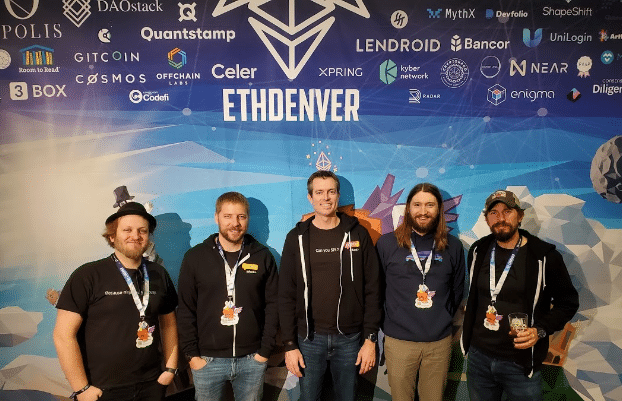

Whiteblock X Splunk at ETHDenver
source link: https://medium.com/whiteblock/whiteblock-x-splunk-at-ethdenver-147bf6a9795
Go to the source link to view the article. You can view the picture content, updated content and better typesetting reading experience. If the link is broken, please click the button below to view the snapshot at that time.
Whiteblock X Splunk at ETHDenver


The third ETHDenver hackathon took place over February 14–16, resulting in an amazing assortment of projects submitted by hackers. For the second year running, the organisers constructed a pop-up economy for a few days that let attendees transact with vendors or donate to charities. Splunk and Whiteblock worked together to support and visualise this payment network. Watch the video below or read on to see how it all worked.


Why a pop-up Economy?
By creating an event specific currency, hackers can interact with sponsors, vendors, and charities, all without having t o worry about credit cards or cash. This was crucial for ETHDenver, an event that prides itself on creating a comfortable environment for hackers. Each hacker was allocated $24 USD in BuffiDAI, named after the mythical mascot of the event. This currency lives on the x-DAI network , which is a Proof of Authority (POA) sidechain anchored to Ethereum. This means lower blocktimes, faster transactions, and generally a much better user experience.
Interacting with the pop-up economy went like this: First, login to your mobile wallet. Next, order food from one of the food trucks. To pay, use the wallet to scan a QR code, and confirm the transaction. Wait for payment to confirm, and in a few minutes, receive delicious food! The same flow worked for donating to the many charities that were working at the event, or buying swag from the swag shop.
How Whiteblock Supported The Event
Our contribution was to provide a local xDai infrastructure, peered with the xDai mainnet, to make all of this possible. For Whiteblock , that meant on-prem servers which acted as local caching for transaction data as well as node redundancy in case of network issues. The Whiteblock team worked closely with Austin Griffith , who pioneered the Burner Wallet, as well as David Mihal and (last name). This team was responsible for putting out fires before they started, as well as tracking recurring issues.

The Splunk team made all of these efforts visible to attendees. Using Splunk Connect for Ethereum , the team took the live event economy data and translated it into an easy to understand interface. This made for an interactive experience where, for example, attendees donating to any of the charities could see their value being transferred and subsequently displayed on any of the venue screens.

In total, Splunk infrastructure supported:
- 3,306 Buffidai transactions
- 685 XP transactions
- 18,964 Buffidai spent on food
- 1,218 wallets active wallets
The visualisation also continued after the event, at the Dappy Hour put on by Maker. There, attendees were given a fresh burner wallet with preloaded funds that they could use for drinks. Alternatively, they could send it to any of the charities. Totals included:

It was great to return to ETHDenver and help the organisers pull off such an amazing event. We had an amazing time and are already looking forward to next year’s event.
Learn more about Splunk.
Learn more about Whiteblock and Genesis.
Recommend
About Joyk
Aggregate valuable and interesting links.
Joyk means Joy of geeK